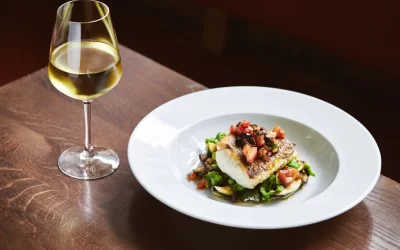Les vins blancs moelleux offrent une richesse aromatique et une douceur équilibrée qui en font des alliés parfaits des accords sucré-salé. Ces vins, souvent associés aux desserts, se révèlent aussi excellents pour sublimer des plats mêlant saveurs sucrées et salées.
Qu’est-ce qu’un vin blanc moelleux ?
1. Une définition simple
Un vin blanc moelleux contient une quantité modérée de sucres résiduels, offrant une douceur naturelle sans être trop sucrée.
- Différence avec un vin sucré : Les vins moelleux sont plus légers en sucre que les liquoreux, tout en conservant une belle fraîcheur.
- Cépages utilisés : Sémillon, Muscat, Chenin, Riesling.
2. How are they produced?
Ces vins sont souvent élaborés grâce à une vendange tardive ou par l’action de la pourriture noble (Botrytis cinerea).
- Exemple : Le Sauternes, produit en Gironde, est un vin blanc moelleux célèbre dans le monde entier.
Les caractéristiques des vins blancs moelleux
1. Une palette aromatique riche
Les arômes des vins blancs moelleux incluent des notes de fruits exotiques, de miel, d’agrumes et parfois de fleurs blanches.
2. Une structure équilibrée
La douceur du vin est équilibrée par une acidité naturelle, rendant ces vins agréables à boire sans lourdeur.
3. Une grande polyvalence
Ils conviennent autant aux apéritifs qu’aux plats principaux ou aux desserts, en particulier dans les accords sucré-salé.
Les meilleurs accords sucré-salé avec les vins blancs moelleux

1. Asian cuisine
Les plats asiatiques, souvent sucrés-salés, se marient parfaitement avec ces vins.
- Accords :
- Canard laqué : un Gewurztraminer moelleux sublime le côté caramélisé du plat.
- Poulet au miel et sésame : un Riesling moelleux équilibre la richesse de la sauce.
2. Fromages à pâte persillée
Les vins blancs moelleux adoucissent le caractère salé et puissant des fromages comme le Roquefort ou le Stilton.
- Vin recommandé : Sauternes ou Monbazillac.
3. Viandes blanches en sauce
Les volailles ou le porc accompagnés de sauces sucrées trouvent un bel équilibre avec un vin blanc moelleux.
- Accords : Poulet à l’ananas, porc aux pruneaux.
4. Fruits de mer et crustacés
Les saveurs iodées des fruits de mer contrastent délicatement avec la douceur du vin.
- Accords : Crevettes caramélisées, noix de Saint-Jacques au beurre citronné.
5. Plats épicés
La douceur du vin atténue la chaleur des épices tout en conservant leur intensité.
- Accords : Curry de légumes, tajine aux fruits secs.
Les régions phares des vins blancs moelleux
1. Bordeaux : Sauternes et Loupiac
Le Sauternes est une référence mondiale grâce à son équilibre parfait entre sucre et acidité.
- Cépages principaux : Sémillon, Sauvignon Blanc, Muscadelle.
- Plats associés : Foie gras, desserts aux fruits.
2. Vallée de la Loire : Coteaux du Layon et Vouvray
Ces appellations produisent des vins frais et fruités, souvent à base de Chenin.
- Caractéristiques : Arômes de pomme, poire, miel.
- Accords : Tarte Tatin, fromages affinés.
3. Alsace : Gewurztraminer et Riesling moelleux
L’Alsace propose des vins moelleux expressifs, idéaux pour des cuisines exotiques et épicées.
- Caractéristiques : Notes de litchi, rose, agrumes.
- Accords : Cuisine thaïlandaise, pâtisseries orientales.
4. Sud-Ouest : Monbazillac et Jurançon
Ces vins offrent une douceur séduisante avec une belle fraîcheur.
- Caractéristiques : Arômes de fruits confits et d’épices douces.
- Accords : Magret de canard, desserts fruités.
Conseils pour apprécier pleinement un vin blanc moelleux

1. Serve at the right temperature
- Apéritifs et plats : Entre 8 et 10 °C.
- Desserts : Entre 10 et 12 °C.
2. Utiliser le bon verre
Un verre à vin blanc légèrement évasé permet de concentrer les arômes.
3. Choisir le millésime approprié
Les vins moelleux gagnent souvent en complexité avec l’âge. Un Sauternes de 5 à 10 ans offre des arômes plus profonds.
4. Expérimenter les accords
N’hésitez pas à tester des combinaisons inattendues avec des cuisines du monde.
Les tendances actuelles des vins blancs moelleux
1. Rise in popularity
Les amateurs redécouvrent ces vins, notamment pour leurs accords avec des cuisines modernes.
2. Orientation vers les vins bio et naturels
De plus en plus de producteurs adoptent des méthodes respectueuses de l’environnement pour ces vins.
3. Intérêt croissant pour les petites appellations
Des régions comme le Jurançon ou les Coteaux du Layon gagnent en reconnaissance.
Erreurs courantes à éviter avec les vins blancs moelleux
1. Servir trop frais ou trop chaud
Une température incorrecte masque les arômes ou accentue trop la douceur.
2. Négliger les accords
Un mauvais choix peut rendre le vin trop sucré ou déséquilibré par rapport au plat.
3. Oublier les millésimes
Certains vins moelleux vieillissent très bien, mais pas tous. Vérifiez la capacité de garde avant de conserver.
Conclusion : des vins parfaits pour des accords sucrés-salés
Les vins blancs moelleux offrent une richesse et une polyvalence qui les rendent incontournables pour les accords sucré-salé. Ces vins, qu’ils viennent de Bordeaux, de la Loire ou d’Alsace, subliment les plats et les desserts en apportant équilibre et douceur. Prenez le temps de découvrir leurs nuances et de les associer à vos recettes préférées pour des expériences gastronomiques inoubliables.
Si vous avez apprécié cet article, n’hésitez pas à lire l’article suivant “Les vins rosés : mythes et réalités sur ce vin estival“, qui pourrait également vous intéresser !





